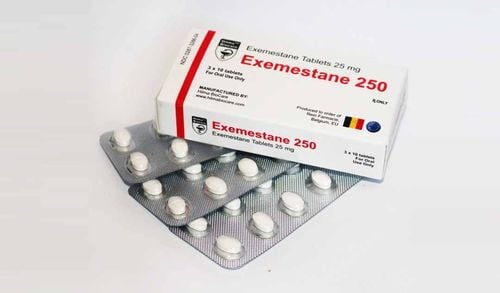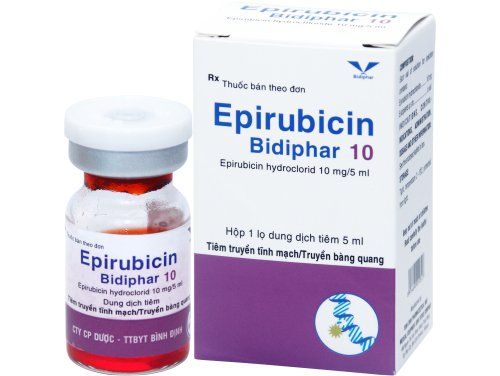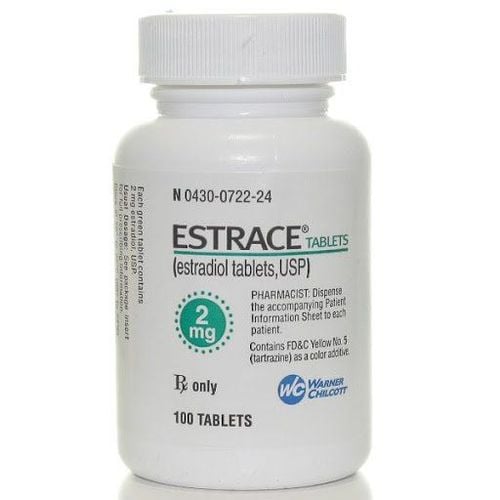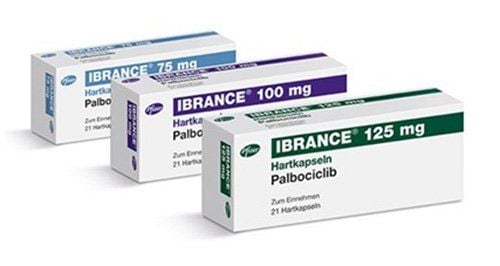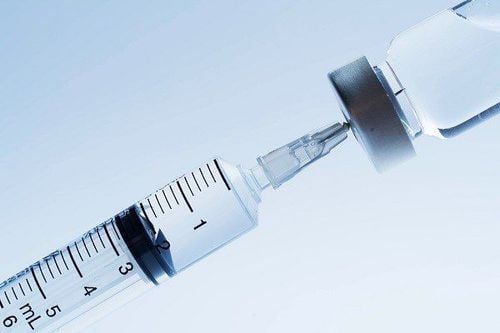This is an automatically translated article.
Fam-trastuzumab deruxtecan-nxki is a prescription drug, a conjugate of antibodies that should be used in the treatment of breast cancer. Find out more information about the drug through the article below.
1. What is Enhertu®?
Enhertu® brand-name drug with the main ingredient is Fam-trastuzumab deruxtecan-nxki, prepared in the form of an intravenous solution.
Fam-trastuzumab deruxtecan-nxki is an antibody conjugate (cell-killing drug-binding antibody) against a protein called HER2 (human epidermal growth factor receptor 2), which is found on the surface of the skin. surface of some cancerous cells. Fam-trastuzumab deruxtecan-nxki is a man-made antibody that causes the immune system to attack cancer cells that contain the HER2 protein. Enhertu is associated with a topoisomerase inhibitor which is a chemical compound that is toxic to cancer cells.
2. Uses of the drug Enhertu®
Enhertu® is used in the following cases:
Breast cancer that cannot be removed with surgery or has spread to other parts of the body and people who have previously been treated with anti-HER2 drugs for breast cancer. :
Where the disease has metastasized, or the breast cancer has recurred during or within 6 months after completing treatment for early breast cancer. Stomach cancer including adenocarcinoma of the stomach or esophagus (GEJ) that has spread to areas near your stomach (locally advanced) or has spread to other parts of your body and who were previously treated with trastuzumab. Note: The drug has not been tested for safety and effectiveness in children
3. Usage and dosage of Enhertu®
Dosage: IV infusion
Dosage: Recommended dose is 5.4 mg/kg IV every 3 weeks (21-day cycle) until disease progression or effects Severe side can not continue treatment. Depending on your condition, the treating doctor will prescribe the appropriate dose and number of treatment sessions.
4. Possible side effects when taking Enhertu
Common or important Enhertu side effects may include:
Lung changes
Enhertu may be the cause of interstitial lung disease, including pneumonia. These problems can develop at the time of treatment, but can also occur months or years after treatment is completed, and they may be more common in people with pre-existing lung disease. Tell your doctor right away if you have symptoms of shortness of breath, cough, or wheezing.
Leukopenia in the blood
White blood cells (WBCs) have an important role in fighting infections. While being treated, your white blood cell count may drop, putting you at higher risk of infection. You should tell your doctor or nurse right away if you have a fever (temperature higher than 38°C), sore throat or cold, trouble breathing, cough, burning when urinating, or a wound that doesn't heal. .
Nausea or vomiting
Nausea or vomiting may occur during treatment, this condition can be overcome by using medicine or using salt water, ginger tea. In addition, dietary changes may be helpful; Avoid foods that can worsen symptoms such as greasy/fatty foods, spices or acidic fruits (lemon, tomatoes, oranges).
Constipation
Here are some measures to help you prevent or prevent constipation during medication use. Include more fiber in your diet (fruits and vegetables), keep drinking 8 to 10 glasses of water, and stay active each day. If you have not had a bowel movement for 2-3 days, you should contact your doctor for advice to help you improve this condition.
Diarrhea
Your doctor may prescribe you medicine to treat diarrhea. To overcome this situation, you should eat low-fiber, bland foods such as white rice and chicken. Avoid eating raw fruits, vegetables, whole grain breads, cereals, and nuts. Soluble fiber that can help relieve pain includes: apple sauce, bananas (ripe), canned fruit, oranges, boiled potatoes, white rice, flour products such as flour, oatmeal. Drink 8-10 glasses of water a day to avoid dehydration.
Fatigue
Common during cancer treatment. Therefore, you need to have a reasonable rest plan during the day. Remedies include: exercise, walk every day
Hair loss
Your hair may become thin, brittle or fall out. This usually occurs two to three weeks after starting treatment. This hair loss can be the whole body hair, the use of scarves, wigs, hats and hair scarves can be helpful in this case. Your hair usually starts to grow back soon after the treatment is done.
Decreased appetite or change in appetite
Side effects of treatment can make it difficult to eat such as you may find that you don't like foods or drinks that you enjoyed before cancer treatment ; or you find the food has no taste at all. These symptoms may persist for several months or longer after treatment ends. You may need to see a nutritionist at your clinic to help with food choices. You should break the day's meals into five or six meals; eat enough nutrients; avoid eating foods that have a bad smell or taste; Add flavor to food by marinating food and using spices such as basil, rosemary.
Anemia (reduced red blood cell count)
Your red blood cells are responsible for carrying oxygen to your body's tissues. When your red blood cell count is low, you may feel tired or weak. You should tell your doctor if you experience shortness of breath, shortness of breath, or chest pain. If your red blood cell count is too low, you may need a blood transfusion.
Thrombocytopenia
Platelets play an important role in the formation of blood clots, helping the blood to clot; therefore, when your platelet count is low, you have a higher risk of bleeding. Tell your doctor right away if you have any bruising or bleeding that won't stop; including nosebleeds, bleeding gums, or blood in your urine or stools. If your platelet count is too low, you may need a platelet transfusion.
To limit bleeding, you can apply methods such as: Do not use a razor, use a soft toothbrush to brush your teeth, avoid sports and contact activities that can cause injury or bleeding, do not use non-steroidal anti-inflammatory drugs, aspirin without consulting your doctor as these can increase the risk of bleeding.
Cough: Tell your doctor if you develop new or persistent coughs.
Electrolyte disturbances: This medicine may affect the normal levels of electrolytes (sodium, potassium, magnesium, phosphate, etc.) This condition is monitored with blood tests.
Stop taking the medicine and call your doctor right away if you have any of the following signs: yellow skin or eyes, dark or brown urine, or stomach pain because you may have symptoms of an infection. hepatotoxicity
Less common but important side effects may include:
Heart problems: Fam-trastuzumab deruxtecan-nxki can cause or worsen pre-existing heart problems, - including angina, congestive heart failure, impaired cardiac function, restrictive cardiomyopathy. Tell your doctor right away or go to the nearest medical center if you have the following symptoms: pain or tightness in your chest, pain in your left arm, back or jaw, sweating, trouble breathing, rough skin, sadness vomiting, dizziness, or lightheadedness Sexual and reproductive concerns: This drug may affect the male reproductive system and cause sperm production to decrease or stop altogether. Besides, sexual desire can also decrease during the use of the drug. If you are a man you can consider a sperm bank if you want to have children in the future. Talk to your doctor about your options before deciding on treatment. This medicine can cause birth defects in an unborn baby, so you should not become pregnant or father a child while taking this medicine. For women, effective contraception is needed during treatment and for at least 7 months after treatment. For men, effective contraception is needed during treatment and for at least 4 months after treatment. You should not breast-feed while taking this medicine and for at least 7 months after you take your last dose.
5. Things to note when taking Enhertu
Before taking you need to inform your doctor about any history of allergy to any ingredient of the drug or to any antigens, history of liver disease, being dehydrated, pregnancy or planning pregnant. These medical conditions may not be safe if you take them, so talk to your doctor to weigh the benefits and risks before taking them.
Store the medicine in a cool and dry place, avoid moisture.
Above is some information about the use of Enhertu medicine, if you have any questions, you should consult your doctor or pharmacist before using the drug.
Follow Vinmec International General Hospital website to get more health, nutrition and beauty information to protect the health of yourself and your loved ones in your family.
Please dial HOTLINE for more information or register for an appointment HERE. Download MyVinmec app to make appointments faster and to manage your bookings easily.
Reference links: oncolink.org, enhertu.com




